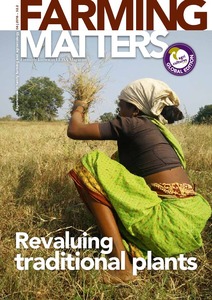Location
At ILEIA, we are committed to strengthening family farming rooted in agroecology. We do this by building bridges between the social movements, the science and the practice of agroecology through documenting and systematising grounded practices. As communication experts, we translate complex ideas into easily understandable language to bring together the insights derived from diverse ‘ways of knowing’, and to catalyse synergies among different actors working to amplify agroecology. We produce a quarterly magazine called Farming Matters, engage in advocacy, training, and facilitation of learning.
We’re proud to be part of the AgriCultures Network, an international network of like-minded organisations documenting and systematising grounded practices. Our network partners, in Brazil, Peru, Senegal, Ethiopia and India, produce Farming Matters’ sister magazines and together we share a mission to mainstream the values, principles and practices that underlie family farming based on agroecology.
Members:
Resources
Displaying 1 - 2 of 2Making millets matter in Madhya Pradesh
A decline in minor millet cultivation rings true across much of India. Yet a country wide revival of this cereal crop is in motion. Farmers are again recognising and asserting the value of minor millets, a cereal crop that was once central to their culture. A group of farmers in Madhya Pradesh have taken strength from farmers in Tamil Nadu who have successfully brought millet back into their fields, their homes and onto plates across their region. This is a story of how learning exchanges and partnerships support amplification of succcessful initiatives.
Women and land after conflict in Rwanda
Female-headed households often experience inequalities in access to resources and income-generating opportunities. Conflicts may make women poorer. But it is important to realise that conflicts also offer an opportunity for change in which gender stereotypes shift and gender roles and identities can be renegotiated. Did genocide and civil war in Rwanda lead to new opportunities for rural women?



